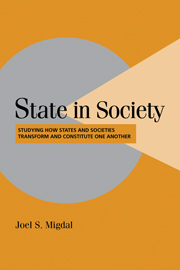Book contents
- Frontmatter
- Contents
- Acknowledgments
- Part I Introduction
- Part II Rethinking Social and Political Change
- Part III A Process-Oriented Approach: Constituting States and Societies
- Part IV Linking Micro- and Macro-Level Change
- Part V Studying the State
- 7 STUDYING THE POLITICS OF DEVELOPMENT AND CHANGE: THE STATE OF THE ART
- 8 STUDYING THE STATE
- Bibliography
- Index
- Titles in the series
7 - STUDYING THE POLITICS OF DEVELOPMENT AND CHANGE: THE STATE OF THE ART
Published online by Cambridge University Press: 05 September 2012
- Frontmatter
- Contents
- Acknowledgments
- Part I Introduction
- Part II Rethinking Social and Political Change
- Part III A Process-Oriented Approach: Constituting States and Societies
- Part IV Linking Micro- and Macro-Level Change
- Part V Studying the State
- 7 STUDYING THE POLITICS OF DEVELOPMENT AND CHANGE: THE STATE OF THE ART
- 8 STUDYING THE STATE
- Bibliography
- Index
- Titles in the series
Summary
When Daniel Lerner surveyed Middle Eastern societies nearly half a century ago, the word that came to mind as he sought to make sense of the many images he encountered was “chaos.” It is not a term most social scientists would use very comfortably in describing any sort of situation. Lerner's initial bewilderment at the dizzying pace and scope of change was not atypical, however, nor was his response to societies seemingly engaged in a headlong rush into confusion. As Harry Eckstein put it, “The development theorists tried, in essence, to find patterns in pervasive novelty and seeming flux – to get bearings in a world devoid of all fixity and precedents.” Lerner's reaction, much like that of other social scientists, was to ferret out a pattern, a system – indeed, even to impose an intellectual order where social and political order could not be discerned. The term development came to denote the movement from social and political “chaos” in Africa, Asia, and Latin America toward some implicitly understood order.
From the beginning, the field of development and change was constitutive; it was the musings of scholars seeking the principles of political and social orders and the conditions initiating them. Although the study of formal constitutional process was already considered somewhat antiquated in political science by the end of the 1950s, writing on non-Western politics came to be nothing less than excursions into how societies and states might be constituted – or better yet, reconstituted.
- Type
- Chapter
- Information
- State in SocietyStudying How States and Societies Transform and Constitute One Another, pp. 195 - 230Publisher: Cambridge University PressPrint publication year: 2001



